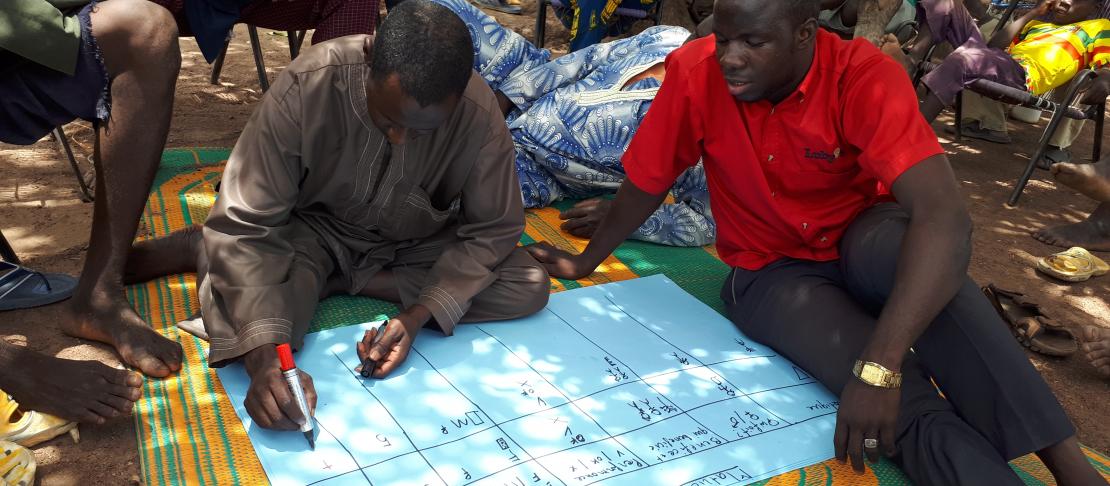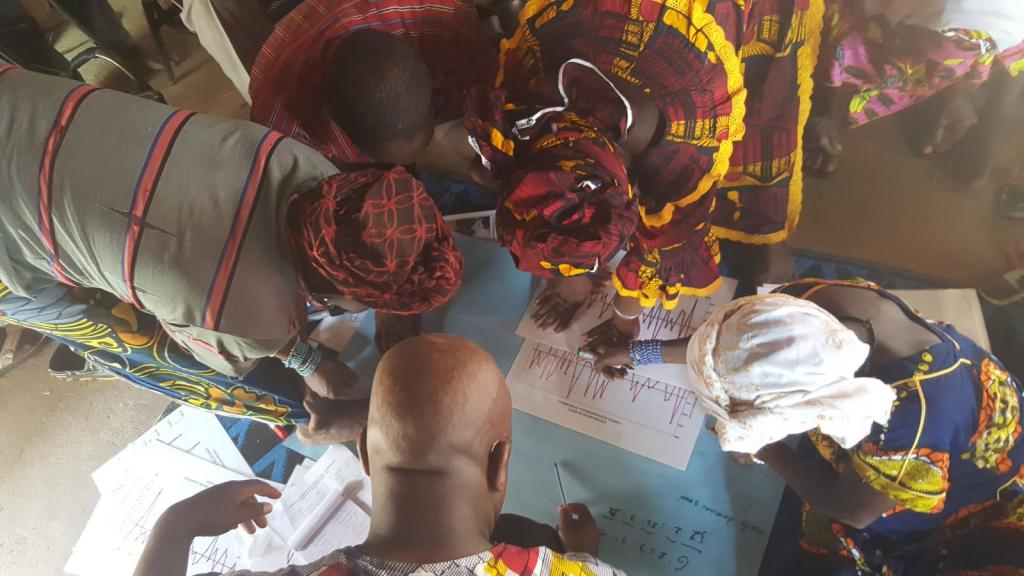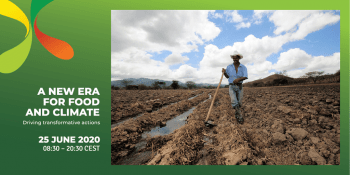Empowering farmers with climate information for agricultural decision making in rural Mali

How can farmers make better decision based on climate information and increase productivity?
Nowadays, the major challenge faced by smallholder farmers in Mali is the lack of accurate climate information to make better planning and decision to either improve or stabilize productivity.
To improve farmer’s climate risks resilience in West Africa, the CGIAR Research Program on Climate Change, Agriculture and Food Security (CCAFS) has been implementing the Participatory Integrated Climate Services for Agriculture (PICSA) approach through the CASCAID project, led by the International Crops Research Institute for the Semi-Arid Tropics (ICRISAT).
Due to its objectives in mainstreaming climate change and variability issues in its activities, the Africa RISING program, led by ICRISAT, started a joint venture with CCAFS under their activity “Scaling out climate information services (CIS) use through the Participatory Integrated Climate Services for Agriculture (PICSA) approach to developing Climate-Smart Villages (CSV) in the Africa rising site of Bougouni in Mali” to scale up the PICSA approach in order to help bridge the climate information gap of smallholder farmers.
It is under this collaboration that ICRISAT organized a training to build the capacity of extension workers of the Africa Rising program based in Bougouni, as well as government staff and NGOs with the use of the PICSA approach. This training was technically supported by the CASCAID project.
The PICSA approach, developed by the University of Reading, aims at providing farmers with locally specific climate information, together with diverse locally pertinent options on crops, livestock and other livelihood activities, with the use of participatory tools, to aid their decision making and therefore improve their livelihood. It is important for farmers to integrate climate information when planning their agricultural activities, particularly in this era of climate variability and change.
A set of participatory exercises was a good occasion to bring together 25 participants, including 6 resource persons, from Malian Association for Sustainable Development (AMEDD), ICRISAT, World Vegetable Center (AVRDC), World Agroforestry Center (ICRAF), Mali Météo, The Malian Textile Development Company (CMDT), Ministry of Agriculture, National Federation of Producers of Organic and Fair Farming in Mali (FENABE), Ministry of Water and forestry, among others.
Eight of the trained agents were Africa RISING agents and served as a relay for the dissemination of the approach to small-scale agricultural producers in the Africa RISING’s intervention villages (Madina, Flola, Dieba, Sibirila) with the aim of reaching 200 farmers. The next step is to reach more farmers the coming years, and to scale out the approach to other Africa RISING regions such as Koutiala and Mopti.
Now I understand better why actors in the agricultural sector, particularly farmers, should change their behavior in a context of increasing climate variability and change, this approach would be very beneficial to our famers here in Bougouni," said a participant towards the end of the training.
Participants were very amazed at understanding the difference between climate change and variability explained by the national meteorological agency of Mali (Mali Meteo).
Thanks to the training I now know the difference between climate variability and climate change which was a confusing concept some days earlier!
The enthusiasm increased when the session dedicated to computing risks of various events happened. A group of participants concluded that, as farmers, they will not decide to sow before the 9th of May in Bougouni as the probability that the rainy season starts before or on that day was very low (approximately 3 years on 8). PICSA, therefore enables farmers to understand the climate of their locality and also to compute risks of diverse climate events happening to mitigate climate related risks, improve their resilience and consequently improve their livelihood. The climate information is provided as time series graphs by Mali Meteo which also uses this opportunity to expand the use of their database.
It was emphasized that farmers are the ones who should make any single decision in their planning activities based on their context and socioeconomic situation. The role of the field agent is to positively influence these decisions by providing them with useful and usable information and helping them integrate the decision in a sustainable manner. This information include locally specific climate information, diverse options on crops, livestock and other livelihoods together with their performance in different climate scenario, and participatory decision-making tools.
Farmers have always relied on ancestral or abstract knowledge to predict the trend of the rainfall season, the hope is that they will couple this knowledge with the scientific one brought through PICSA to improve their productivity.
Farmers have been using endogenous knowledge for centuries to make agricultural decisions, the scientific knowledge through PICSA comes as a complement to improve and enlighten their agricultural related decisions,” said Dr. Bouba Traore, research scientist at ICRISAT.

Female farmers computing climate risks based on historical time series graphs. Photo: Andree Nenkam (ICRISAT)
Female farmers are most of the times not involved in some rural activities, particularly the collection of rainfall data using rain gauges in local villages, and this is due to the men’s traditional thinking that the task is only for men. However, hard-working women would also like to be involved in such activities as this would also enhance their decision making and resilience against climate variability. A woman of the Flola village, where we held the practical field day, clearly stated this need:
“We would like to be involved in the rainfall data collection using rain gauges the same way men are involved ”
This practical day was done on the fourth day of the training to help participants practice what they had been learning.
Although this fourth day was just a practical day, farmers, including elders, showed high interest in the concept, as well as to the climate risks calculation exercise which even required more concentration and understanding. To immortalize this day, producers wanted to keep the results of the work as a memory for future generations.
It was also amazing to learn that farmers in Bougouni usually plant twice (short maturing crop) during the rainy season, despite the availability of rainfall (1070 mm on average) and the length of the season (152 days on average).
"Most farmers plant twice to reduce risks related to climate variability particularly with the increase in dry spell length at the middle of the season. PICSA will then help them to improve their agricultural management practices to conserve more water in the soil," reported Dicko Mahamadou Moctar (representative of Africa Rising at Bougouni). The fact is that climate information is unknown to most of the farmers in Bougouni. The PICSA approach, then, helps fill this gap in order to reach more farmers and empower them to make better decisions, by providing efficient information, tools and mechanism.
Andrée Nenkam is Scientific Officer at ICRISAT-Mali
Bouba Traoré is Scientist, Knowledge Broker for Climate Science at ICRISAT-Mali
Dansira Dembélé is communications assistant at CCAFS West Africa based at ICRISAT-Mali
Mathieu Ouédraogo is Scientist at CCAFS West Africa based at ICRISAT-Mali



